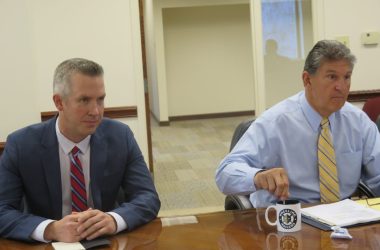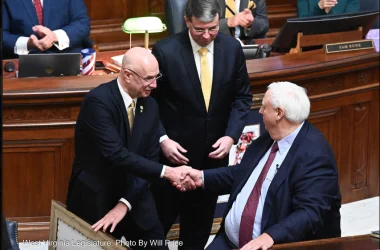By CONOR GRIFFITH
The State Journal
MORGANTOWN, W.Va. — Two faculty members at WVU’s Benjamin M. Statler College of Engineering and Mineral Resources plan for their research to have out-of-this-world applications.
Associate professors in mechanical and aerospace engineering Jason Gross and Yu Gu were recently awarded nearly $300,000 in funding from the National Geospatial-Intelligence Agency to study the operations of ground robots and aerial drones in a hazardous environment for them — underground, where global position system (GPS) signals can’t reach them.
“The idea there is we’re trying to enable drone operation in completely GPS-denied environment, and we see a potential to help with things like search-and-rescue operations in tunnels or underground areas,” Gross said, adding that their work as already attracted the attention of colleagues in the college’s mining department. “They brought to our attention that there is an emphasis on using drones in mine safety applications.”
The team will conduct tests at the West Virginia Memorial Tunnel Complex near Charleston. Operated by the West Virginia National Guard, the complex provides a realistic environment where first responders train for emergency situations.
Gu said they also won $750,000 for finishing first at a NASA competition last year that allowed for a number of research opportunities, such as working on a Mars rover with increased autonomy in conjunction with NASA’s Jet Propulsion Laboratory, which builds the rovers.
“The main idea behind it is today’s Mars rovers are autonomous, but not very autonomous,” he said. “There are a lot of challenges. They don’t really drive too fast and they rely on humans on Earth to direct them what to do, which is good for now, but not great for future explorations, which require a lot more autonomy.”
Gu said he and Gross are also working with the U.S. Department of Agriculture to develop robots that can pollinate crops to compensate for the decreasing honeybee population. A robot with the appropriate equipment was already tested in greenhouses on the Evansdale Campus. Gross said GPS signals don’t reach the robot inside the greenhouse, so this was also an opportunity to test the increased robot autonomy.
The professors said their work could one day have applications within the icy depths of Europa, the icy moon of Jupiter thought to harbor a global ocean beneath 6.2 miles of ice, and possibly life. Gu noted that Mars is ripe for exploration due to all the satellites orbiting it, but it will take a long time before such a mission is ready for Europa.
Looking back, both Gross and Gu said many talented students worked on these projects to make them a reality. Looking forward, both said they need more students to get involved to keep the research moving ahead and hope to recruit the most talented minds West Virginia has.
Gu said whether these students find careers on a farm, in a mine or elsewhere in high technology can be a part of that.
See more from The State Journal and other WVNews papers




